• December 13, 2015
Please welcome our new regional coordinator
Isai Fajardo Tapia (Mexican Space Agency)
• November 23, 2015
Please welcome our new regional coordinator
Marco Gómez (Costa Rican Institute of Technology)
and new co-cordinator Ivandro Rodrigues (Angolan Methodist University)
• September 28, 2015
Please welcome our new regional coordinator
Jim Hefkey (University of Auckland, New Zealand)
• July 15, 2015
The 4th Mission Idea Contest will be held on 17-23 October 2016 at Istanbul Technical University, Istanbul, Turkey.
• July 10, 2015
The Pre-4th MIC Workshop has been successfully completed.
Ertan Umit (von Karman Institute for Fluid Dynamics, Belgium) won the Best Proposal Award.
• June 15, 2015
The profiles of the resource providers are now available.
• May 4, 2014
The regional seminar in Egypt is available online (in Arabic).

Contact: Ayman Kassem
• April 15, 2014
Regional seminar in Saudi Arabia on April 21, 2014
at King Fahd University of Petroleum and Minerals (KFUPM).
Contact:
Mohammed Khalil Ibrahim
• April 2, 2014
Download Introduction to 3rd Mission Idea Contest (MIC3) for micro/nano satellite utilization

• March 24, 2014
Regional seminar in Ghana on April 8, 2014
All Nations University College, Main Campus
Contact:
Manfred Quarshie
• March 15, 2014
Regional seminar in Monastir, Tunisia on March 28, 2014
During the 2nd Maghreb International Courses
in Spatial Technology
Contact:
Kamel Besbes
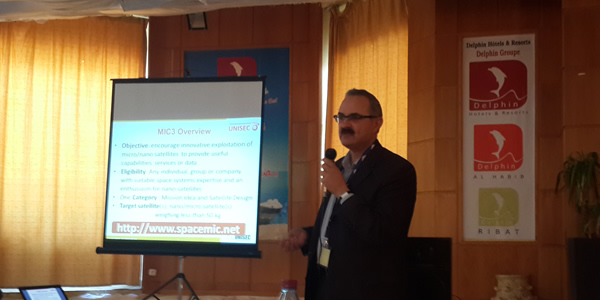
• March 15, 2014
Regional seminar at Kyushu Institute of Technology, Japan on April 4 (Fri), 2014
Contact:
John Polansky
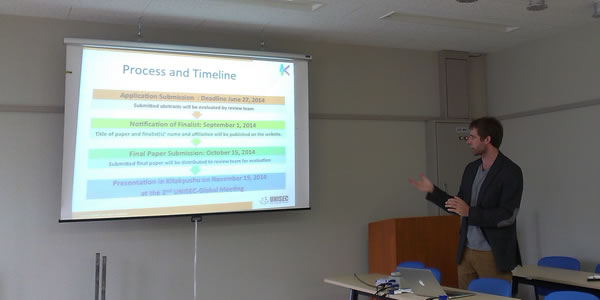
• March 7, 2014
Please welcome a new regional co-coordinator in Japan:
John Polansky, Kyushu Institute of Technology
• February 15, 2014
Please welcome a new regional coordinator in Belgium:
Ertan Umit, Von Karman Institute for Fluid Dynamics
• February 14, 2014
Call for Paper: The 2nd UNISEC Global Meeting including the 3rd Mission Idea Contest
• January 10, 2014
Please welcome a new regional coordinator in Switzerland:
Cem O. Asma
• December 5, 2013
The Pre-MIC3 workshop presentations are available online!
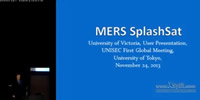
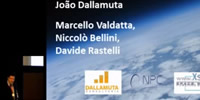
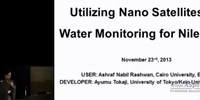
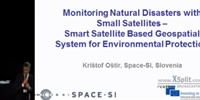
• Nov 23, 2013
PreMIC3 was successfully held on Nov. 23, 2013.
The best propsal award was given to the team of "Utilizing Nano
Satellites for water monitoring for Nile River" presented by Ashraf
Nabil Rashwan, Cairo University, Egypt and Ayumu Tokaji, University of
Tokyo, Japan.
• Nov 1, 2013
New regional co-coordinator:
Dr. Alsultan, at International Society of Photogrammetry and Remote Sensing
• Oct 23, 2013
See the criteria for
Best Proposal Award
• Oct 1, 2013
User-Developer Matching Results
Please welcome the five user & developer teams!
The selected five teams will work together and make presentation on
November 23 during the 1st UNISEC Global Meeting.
[Matching Results]
[UNISEC Global]
• Sep 24, 2013
New regional co-coordinator:
Professor Santoni, University of Rome la Sapienza, Italy
• Sep 7, 2013
We are pleased to share a wonderful news from Bulgaria.
The small satellite mission described in Bulgaria's MIC2 semi-finalist paper won the Bulgarian government grant for the implementation.
[ More ]
[ In Bulgarian ]
• Aug 23, 2013
New regional co-coordinator:
Professor Jeung, Seoul National Univ., Korea
• Aug 20, 2013
See the list of the User Needs
• Aug 20, 2013
Application of Satellite Users is closed.
Application of Satellite Developers is still open. Take a look at the list of the User Needs and select the problems you want to solve by using satellites!
• Aug 9, 2013
Online registration is now open
• Aug 4, 2013
Please welcome the Pre-3rd MIC Review Team!
• Aug 2, 2013
Please welcome the Pre-3rd MIC Regional Coordinators in the world!
• July 9, 2013
PreMIC3 Application Forms for satellite users and developers are available.
 Satellite Users
Satellite Users
 Satellite Developers
Satellite Developers
• July 4, 2013

Visit us on Facebook, too!
• July 1, 2013
First annoucement of Pre-MIC3
Presentations of pre-proposals for the 3rd Mission Idea Contest (Pre-MIC3) will be held during the UNISEC-Global meeting. Selected speakers will be invited to present their ideas regarding the potential utilization of micro/nano-satellites.
[Guidelines for pre-proposal]
•January 6, 2013
A Happy New Year!
The presentations of the MIC2 finalists are available online!
•December 2, 2012
The IAA book series Novel Ideas for Nanosatellite Constellation Missions was published (based on the ideas of MIC 1 finalists).









